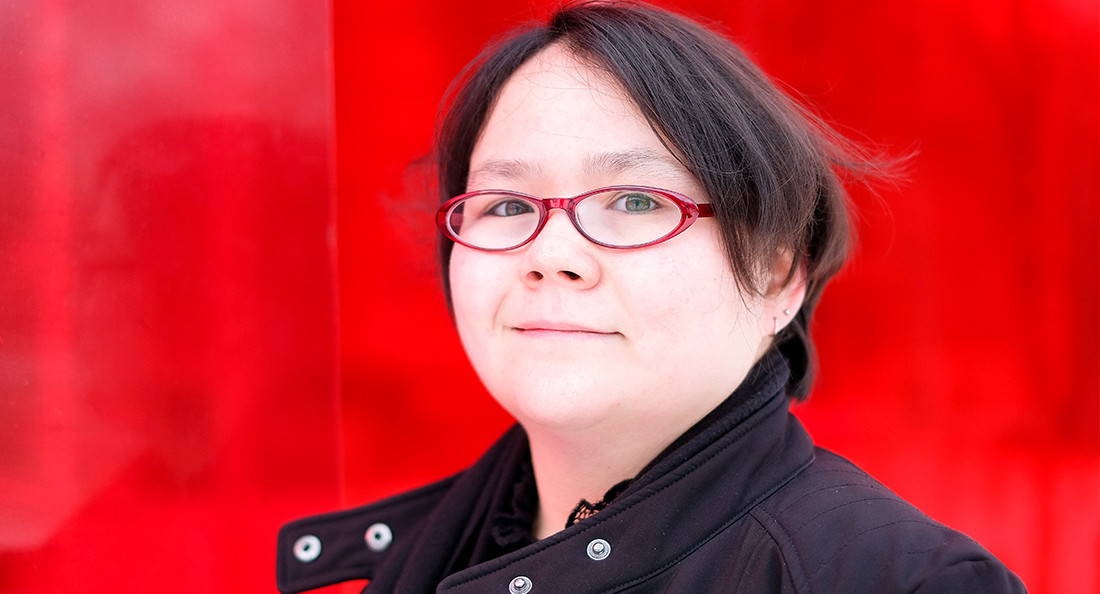Punching up
Prototypical standup humour is laughably outdated
Winnipeg’s comedy scene was divided in 2019 over the issue of Louis C.K. performing at Rumor’s Restaurant and Comedy Club.
In November 2017, C.K. admitted that allegations he committed sexual misconduct and abuse were true. After a brief hiatus, C.K. returned to standup with material that mocked school-shooting survivors, gun-control movements, and the Holocaust.
For some, the jokes C.K. makes are accepted as standard comedy material. Many others in Winnipeg’s comedy community, however, recognize that not only is the standard in comedy tired and worn, but it also has a tendency to punch down. Jokes are made at the expense of marginalized identities, including but not limited to: women, queer folks, fat people, people with disabilities, People of Colour, migrants, drug users, sex workers and members of certain religions, among many other others.
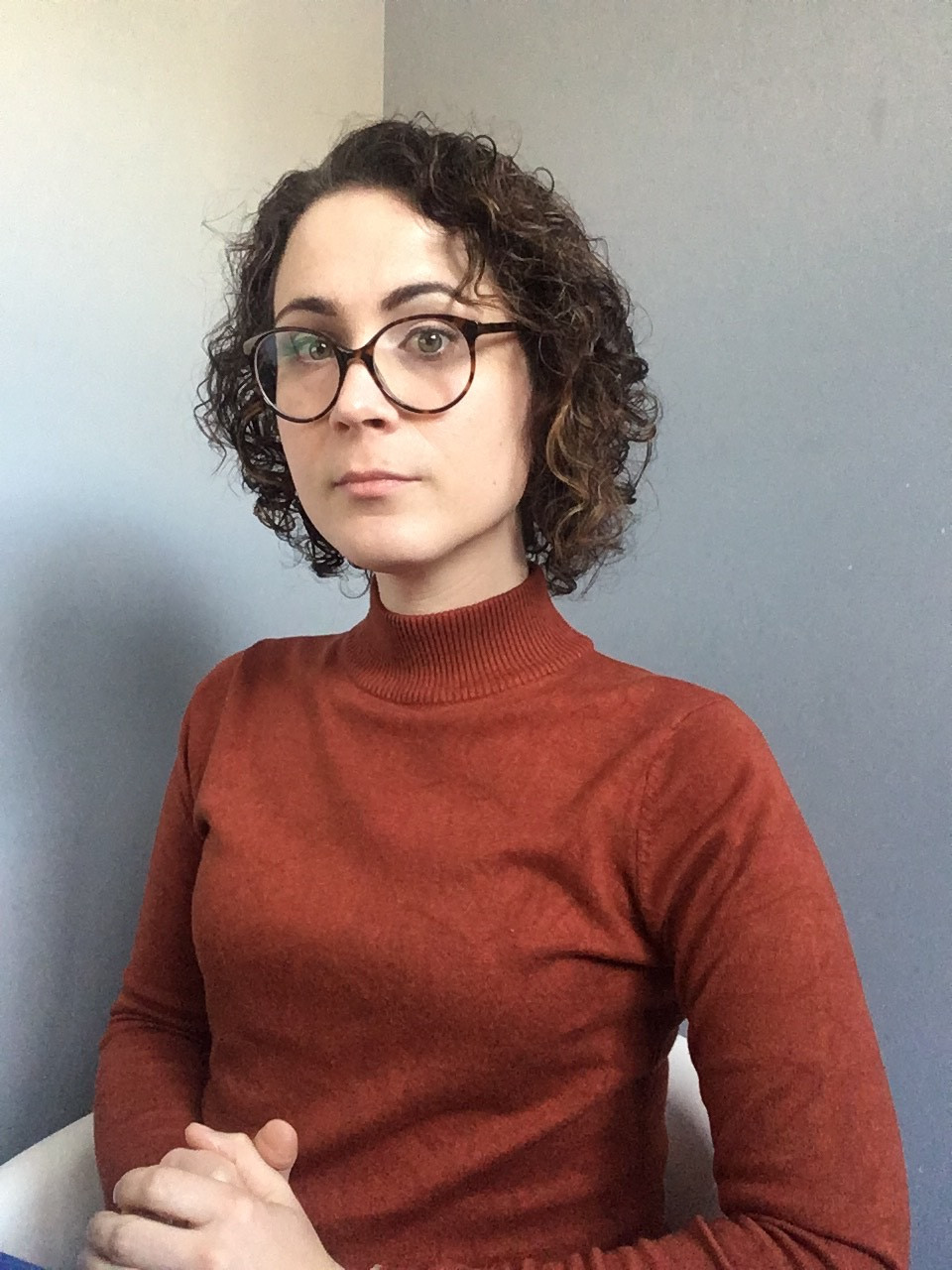
“My audience is sort of the people who are comedy fans but just don’t want to go to a comedy show, because they know they're probably going to be the butt of someone’s jokes." - comedian Abby Falvo
Shannon Bloodworth has performed their standup at Fame Nightclub, the Winnipeg Comedy Festival and Club 200 and been part of shows, including Queer and Present Danger and the Winnipeg Comedy Showcase.
Bloodworth explains that oftentimes in traditional comedy, these marginalized identities are the punchline to the joke. This “punching down” typically occurs in comedy performed by straight cis white men – the prototypical comedian.
“Then, you started getting more diverse comedians talking about their own experiences,” Bloodworth says, bringing about the counteractive notion of punching up.
“I think it’s more complicated than just sort of a role reversal,” Bloodworth says. “When I talk about being queer, I’m making sure that queer people are never the butt of the joke, but I’m also not making fun of straight people. I’m really making fun of homophobia and transphobia, and these wider systemic issues that kind of keep us at odds with each other.”
Bloodworth has a sort of dry sense of humour that pairs well with physical comedy. Part of their set includes a bit about their top surgery, the punchline of which is either a gibe on country music or the surprise appearance of googly eyes.
For Bloodworth, talking about their surgery on stage is a way to reduce the tension around the topic of gender-affirming surgeries.
Abby Falvo, who came out as trans on stage, also uses her stage presence to alleviate tension and discuss difficult topics.
“The audience really recognizes when you’re genuine about stuff and when you’re vulnerable, and that sort of material tends to hit harder,” she says.
Falvo hosts a monthly show at Wee Johnny’s called Party Mix!, where she does her best to book women, People of Colour and queer comedians.
For Falvo, the audience plays a large role in what jokes will be told or how the jokes will be told. “There’s a phrase that some friends and I came up with, which is to describe cis dudes in the crowd. We call them ball caps,” she says.
If the crowd is dense with ball caps, Falvo will adapt her material, which is usually geared toward a queer crowd. Despite her flexibility, Falvo typically prefers an audience to which she can relate.
“My audience is sort of the people who are comedy fans but just don’t want to go to a comedy show, because they know they’re probably going to be the butt of someone’s jokes,” Falvo says.
Despite the existence of comedians who are women, queer, fat or People of Colour, the notion that there’s a universal standard in comedy is still prevalent. Bloodworth mentions seeing a comment on their social media, “saying how, like, at the end of the day, people just want to laugh and there’s a reason there’s a status quo for things in comedy.”
“Personally, the status quo has never made me laugh,” Bloodworth says.
While the perspective of a straight cis white male is considered widely applicable, marginalized voices tend to be percieved as niche, Bloodworth says.
“Everybody is supposed to understand and sympathize with, like, straight white men, but they don’t have that same responsibility to try to understand women or People of Colour,” Bloodworth says.
Danielle Kayahara has performed at the Winnipeg Comedy Showcase, Winnipeg Fringe Festival and Winnipeg Comedy Festival – although recently she has mostly been making jokes on her Twitter, @shetellsjokes.
Kayahara says her set stays much the same, regardless of the audience.
“As much as there’s a bit of flexibility there, I also find myself not willing to bend my own perspectives and voice to please an audience if it goes against ... who I am or how I feel about a particular thing,” she says.
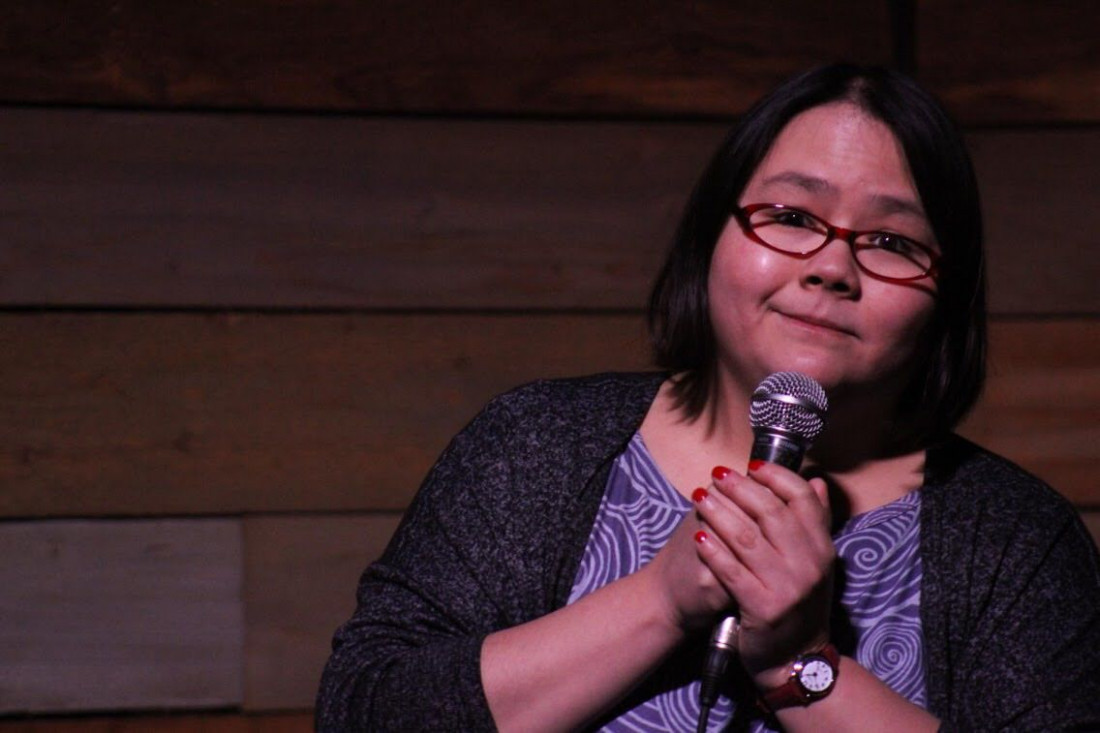
“I think comedy has a great ability to bring people together, and that’s kind of where I like to try and put my focus.” -comedian Danielle Kayahara
In their comedy, Bloodworth discusses personal experiences related to their identity. For instance, Bloodworth jokes about how they turn the tables when people assume they’re pregnant.
“Oh yeah, I’m eating for two, give me your extra slice of cake,” Bloodworth laughs.
“I’m not making fun of fat people. I’m not making fun of thin people for reacting the way they do. The problem is the awkwardness around and that fear of becoming fat, the fear of ‘I don’t know what to say,’” Bloodworth says.
Falvo maintains that comedy intrinsically is about punching up.
“It’s very inherent of that kind of spirit of comedy, and what could be more punching up than punching at the patriarchy and punching at, you know, capitalism and all these other things?” Falvo asks.
Kayahara says her comedy comes from her experiences, and she is reaching out to connect to her audience through jokes.
“Oftentimes, the stuff I’m focusing on is just stuff that I struggle with in the world, and I mostly just want anyone else who struggles with those things to not feel as alone,” Kayahara says. “The last thing that I think comedy should do, personally, is separate people in that way or call out anyone who might already feel sort of marginalized or set aside from the world.”
Sarah London has performed at the Winnipeg Comedy Festival, but she’s perhaps better known recently for the open mics she hosted on her Instagram in the spring of 2020.
London says she doesn’t make jokes that are mean-spirited, and she thinks about her friends and parents in the audience.
“I want to feel good about the jokes I do,” she says.
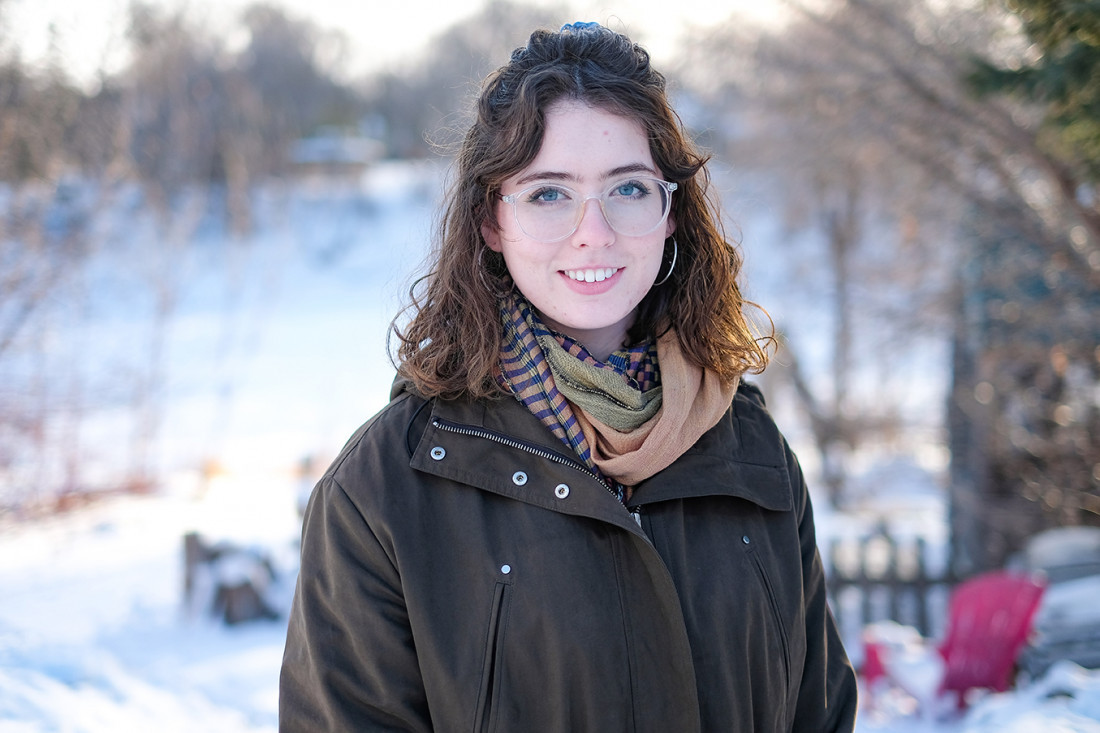
Comedian Sarah London says she doesn’t make jokes that are mean-spirited, and she thinks about her friends and parents in the audience.
Thiané Diop performs standup with the WOKE Comedy Hour.
“The thing that I love about comedy as an art form or as a medium is that it’s a way that you can connect with people ... especially when you’re performing it, and you can hear the feedback from whoever your audience is,” Diop says.
Diop says she “is a big fan of punching up in comedy.”
“Part of the thing that I really appreciate about comedy is being able to punch up and talk about experiences that are very near and dear to me, and particularly if they’re experiences that have ... come from being more on the margins of this society, to have an audience who laughs in way where you can hear that they’re laughing from a place of understanding is such a beautiful thing,” Diop says.
According to Diop, the WOKE Comedy Hour provides “a safer space for people who usually end up very intentionally being the butt of the joke in what mainstream comedy is like in general.”
“It’s so hard when you ... have such an intersecting identity, to find a space where all of that is like, respected and honoured, and where you can feel seen in all of that, and WOKE very intentionally offers that,” Diop says.
Bloodworth notes they made it to the semifinals in 2019 in the Rumor’s Winnipeg’s Funniest Person with a Day Job contest.
“I didn't think my material would really fly in front of that crowd,” they say. “I’m not really afraid to talk about (queerness with) different audiences, but I will say it’s definitely more fun in front of a queer crowd, because they get it.”
Bloodworth’s apprehensions about the crowd at Rumor’s are certainly warranted. Past lineups are overwhelmingly male-dominated. In 2019, the decision to proceed with a Louis C.K. show was a divisive catalyst for many comedians in Winnipeg.
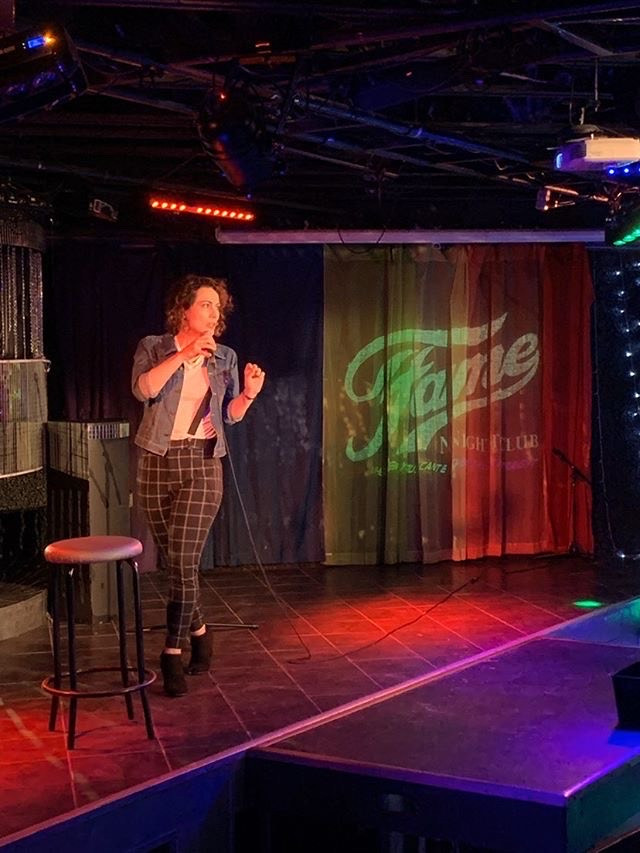
Abby Falvo performs at Fame nightclub.
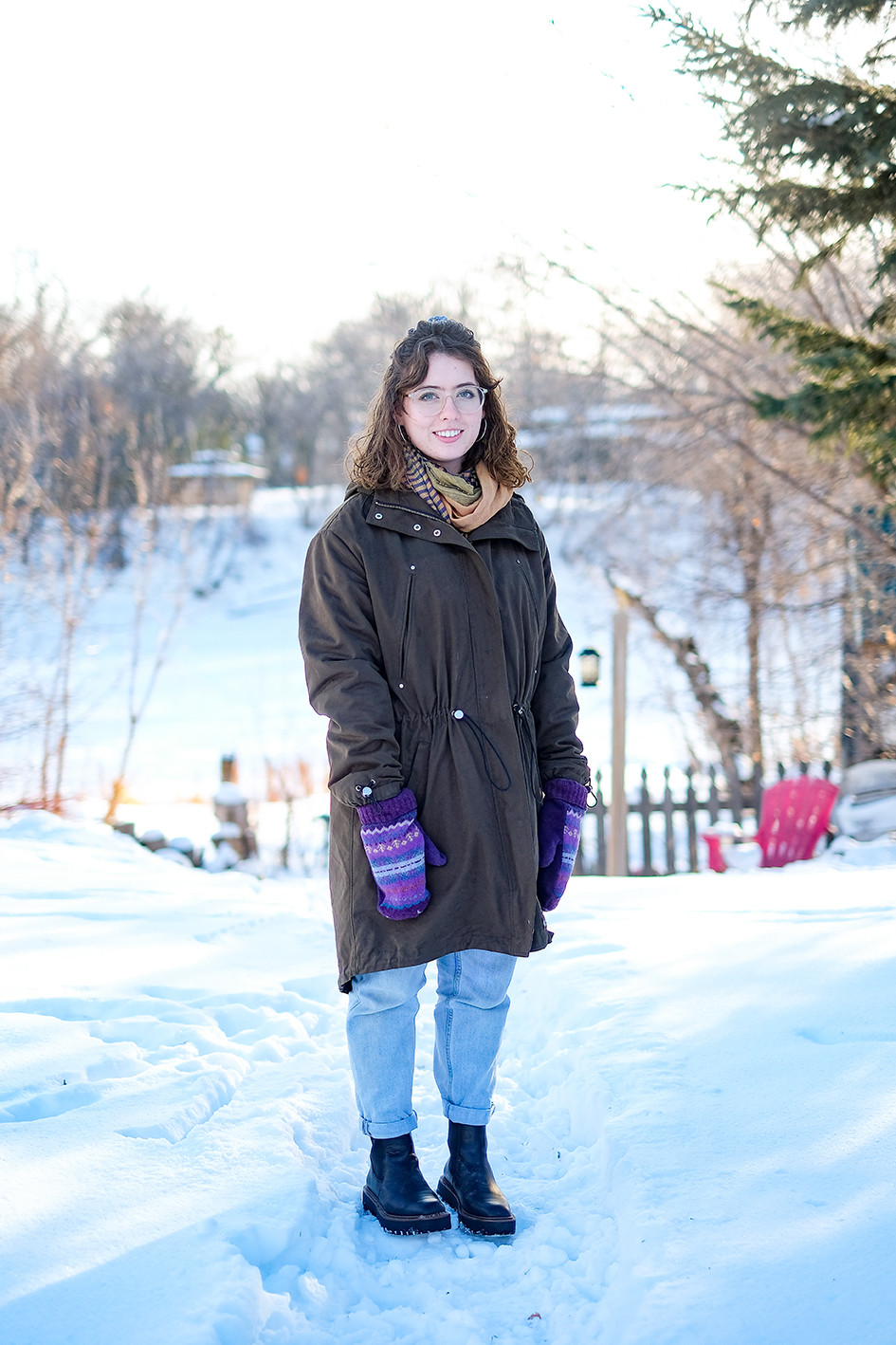
“It's complicated, right, what feels like a safe space to which people. But I think we’re moving in a good direction.” -Sarah London
It “split the community in half. I mean, that's the part that sucks. Because then you have all these comedians having to explain and educate, and that's frustrating,” Falvo says.
In late 2019, the WOKE Comedy Hour, which showcases queer BIPOC comedians, stopped producing shows at Wee Johnny’s. WOKE stated in a Facebook post that they “experienced discrimination while in the space,” among other contributing factors including allegations of sexual assault. For Bloodworth, it was a reminder of who holds privilege in comedy culture.
“Consider whose access and whose comfort you're prioritizing here,” they say.
“I may be queer, but I’m still white, and I have considerably more privilege in that scene than any Comedians of Colour do,” Bloodworth says. “I knew it was a problem, but that was, like, okay this is really real. This is a consequence that now this person doesn't feel comfortable doing comedy anymore, understandably so. And that's a big shame.”
The WOKE Comedy Hour now hosts their monthly show at the Good Will Social Club – although the show is temporarily on hold due to the Code Red restrictions.
As long as comedians are booked to do shows, they will bring their material with them – sharing experiences relating to being a woman, Person of Colour, queer or fat. This is important, especially if the crowd is full of ball caps.
Bloodworth says this visibility helps break down stereotypes of who belongs on stage at a comedy set, even if comedians don’t necessarily directly address their marginalized identities.
Falvo has a joke about Dave Wheeler that she has presented in the Winnipeg Comedy Festival and at the Winnipeg Comedy Showcase, both times garnering mixed reactions (the radio host was hired by Energy 106 in 2020, despite being fired from 92.1 Citi in 2018 after making transphobic comments on air). She believes the joke has the potential to help people start conversations.
“People are a little more disarmed and will listen to you, and if they find that they laugh at it, maybe they’re a little more agreeable to actually being like, oh yeah, that Dave Wheeler guy should be taken off the air,” Falvo says.
London says she is grateful she started doing standup in Winnipeg, because the comedy community has been welcoming and supportive. She notes that her experience isn’t universal.
“It’s complicated, right, what feels like a safe space to which people. But I think we're moving in a good direction. All you can do is try to move forward and create more space for people,” London says.
Both the WOKE Comedy Hour and Party Mix! intentionally try to create safer spaces.
According to Diop, WOKE Comedy Hour also offers a space for comedians to explore what they want their set to be.
“You know, we don’t have to follow like the normative formula of what a standup comedian is, but that we even just get to play with that,” Diop says.
There are no hard-and-fast rules in comedy, but there is a common theme in punching up: sharing experiences, in the hopes that the audience will relate.
“I think comedy has a great ability to bring people together, and that's kind of where I like to try and put my focus,” Kayahara says.
Published in Volume 75, Number 13 of The Uniter (January 7, 2021)

